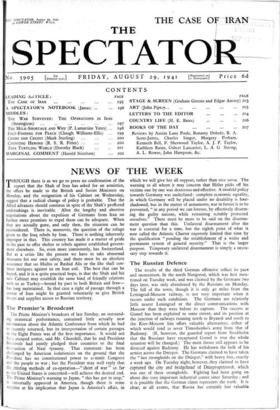The Premier's Broadcast
The Prime Minister's broadcast of last Sunday, an outstand- ing oratorical performance, contained little actually new information about the Atlantic Conference from which he had so recently returned, but its interpretation of certain passages in the Eight Points was of the first importance. It would not have escaped notice, said Ms. Churchill, that he and President Roosevelt had jointly pledged their countries to the final destruction of Nazi tyranny. That statement has been challenged by American isolationists on the ground that the President has no constitutional power to ccmmit Congress and the people to war ; but the President may well reply that the existing methods of co-operation—" short of war " so far as the United States is concerned—will achieve the desired end. The Prime Minister's warning to Japan, " this has got tt, stop," is universally approved in America, though there is some surprise at his implication that Japan is America's affair, in which we will give her all support, rather than vice versa. The warning to all whom it may concern that Hitler picks off his victims one by one was dexterous and effective. A twofold policy towards Germany was underlined: complete economic equality, in which Germany will be placed under no disability is fore- shadowed, but in the matter of armaments, war in future is to be prevented, " in any period we can foresee, by effectively disarm- ing the guilty nations, while remaining suitably protected ourselves." There must be more to be said on the disarma- ment question than this. Unilateral disarmament after the war is essential for a time, but the eighth point of what is now called the Atlantic Charter expressly limited that time by the qualification " pending the establishment of a wider and permanent system of general security." That is the larger purpose. Temporary unilateral disarmament is simply a neces- sary step towards it.


































